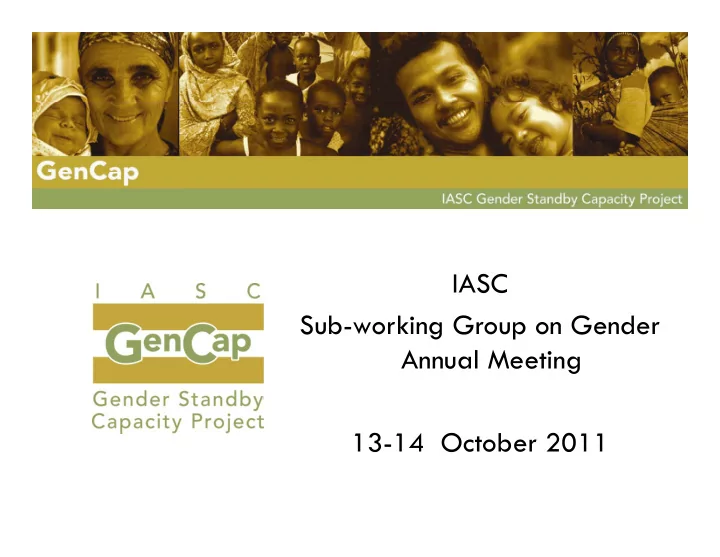

IASC Sub-working Group on Gender Annual Meeting 13-14 October 2011
GenCap IASC Project established in 2007 as a response to evaluations concluding gender keeps falling through the cracks 57 deployments to 29 humanitarian situations by October p y y 2011 Inter-Agency mandate and role: mostly hosted by OCHA and UNFPA Pragmatic and practical advice on how to mainstream gender in humanitarian action How to ensure that women girls boys and men access and How to ensure that women, girls, boys and men access and benefit from humanitarian aid and services? People-centric approach to humanitarian action Driving force behind getting cross-cutting issues on the agenda
GenCap Appeal 2011 p pp 170 months deployments for gender mainstreaming p y g g Establishment of GBV window of GenCap Roster 30 months of GBV deployments p y Support to gender marker initiative Total appeal: USD 4.3 mill
GenCap Status 3Q 2011 p Currently, USD 3.25 mill (of USD 4.3 mill) received for 2011 y, ( ) Australia, Canada, Norway, Sweden Deployment months for 2011 estimated to 135 (of 200) GenCap Support Unit is part of OCHA Core Budget, merged with ProCap Support Unit
GenCap Status 3Q 2011 (cont’d) p ( ) 16 deployments p y 2 completed: Chad, Niger 15 ongoing: CDI, DRC, Ethiopia, Liberia, Somalia, South Sudan, Sudan, Zimbabwe, Yemen CDI DRC E hi i Lib i S li S h S d S d Zi b b Y 1 Roaming GenCap 2 Global Clusters: Geneva and Rome 2 regional, preparedness-focused: Pacific and Southern Africa Gender marker support Establishment of GBV window and recruitment of Gender and GBV experts completed summer 2011 GBV deployments to commence – in consultation with GBV AoR
External Review in 2011 External, independent review taking place August – External, independent review taking place August December 2011 (GenCap and ProCap) Managed by OCHA Evaluation and Guidance Managed by OCHA Evaluation and Guidance Section in New York Provide clear recommendations for continuation for Provide clear recommendations for continuation for projects, and if so, in what shape and form
Status Review What are we doing well? Since mid-2007: 53 deployments to 30 countries, increased activity level Deployments longer to most cluster countries (26 of 28 HC countries) Deployments longer, to most cluster countries (26 of 28 HC countries) Retention of experienced GenCap Advisers on roster Gender marker as effective tool Gender E-learning helping the capacity building in field Cross-cutting issues placed at Global Cluster Leads table - NATF Cost sharing and country team buy in… Cost-sharing and country team buy-in… Multi-year funding indications from several donors… Challenges SADD Gender capacity in humanitarian action: institutionally and persons Accountability – who is responsible for gender? Accountability – who is responsible for gender? Role of UN Women = ?. Who is responsible for coordination of gender?
GenCap SC mtg 12 October p g Discussions more than decisions – awaiting results from the external evaluation More core-staff/ 1-year contracts Continue longer deployments to selected ongoing, Continue longer deployments to selected ongoing, humanitarian crisis Continue support to Gender Marker Increase focus on rapid response to new emergencies (two I f id t i (t roaming GenCaps?) Review impact of regional, preparedness focused d deployments in early 2012 l i l 2012 Relationship SWG Gender and GenCap SC, GenCap as SWG operational arm
Questions and comments?
Impact of deployments p p y Impact on programming p p g g Impact on p institutionalization Impact on institutionalization Impact on programming 3 3 2 2 2 Average score Average score 1 1 0 0 1 (N=25) 2 (N=22) 3 (N=17) 4 (N=13) 5 (N=9) 6 (N=6) 7 (N=1) 1 (N=18) 2 (N=16) 3 (N=14) 4 (N=9) 5 (N=6) 6 (N=5) 7 (N=1) Scorecard number Scorecard number
Recommend
More recommend